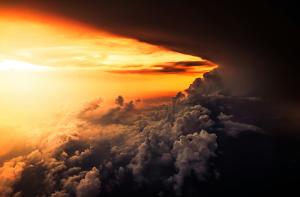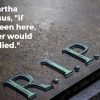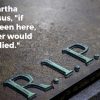
The idea of “heaven” fascinates people. In Revelation 21, John describes the “New Jerusalem.” What does the Bible say about the “New Jerusalem,” and who will live in it?
Scripture:
Ezekiel, chapters 40-41; Psalm 128; Revelation, chapter 21
Revelation 21:1-5 (CEB):
Then I saw a new heaven and a new earth, for the former heaven and the former earth had passed away, and the sea was no more. I saw the holy city, New Jerusalem, coming down out of heaven from God, made ready as a bride beautifully dressed for her husband. I heard a loud voice from the throne say, “Look! God’s dwelling is here with humankind. He will dwell with them, and they will be his peoples. God himself will be with them as their God. He will wipe away every tear from their eyes. Death will be no more. There will be no mourning, crying, or pain anymore, for the former things have passed away.”
Then the one seated on the throne said, “Look! I’m making all things new.” He also said, “Write this down, for these words are trustworthy and true.”
Observations: The “Old” Jerusalem
In today’s Old Testament reading, Ezekiel dates the destruction of Jerusalem by the Babylonians: “In the beginning of the twenty-fifth year of our exile, on the tenth day of the month, exactly fourteen years after the city was struck down, on that very day, the Lord’s power was on me, and he took me there” (Ezekiel 40:1). We find that account in 2 Chronicles 36:17-19:
So God brought the Babylonian king against them. The king killed their young men with the sword in their temple’s sanctuary, and showed no pity for young men or for virgins, for the old or for the feeble. God handed all of them over to him. Then the king hauled everything off to Babylon, every item from God’s temple, both large and small, including the treasures of the Lord’s temple and those of the king and his officials. Next the Babylonians burned God’s temple down, demolished the walls of Jerusalem, and set fire to all its palaces, destroying everything of value.
God showed Ezekiel a vision of what the rebuilt city would look like, focusing on the temple. God promised that He would once again dwell among His people (Ezekiel 43:7). But the Romans destroyed the city and the temple again, in AD 70, in response to the Jews’ rebellion against Roman rule. That set the stage for John’s vision of the “new Jerusalem” in the book of Revelation.
The “New” Jerusalem – A New Beginning
The beginning words of Revelation 21 demonstrate that John is describing an entirely new order of things. I saw a new heaven and a new earth, for the former heaven and the former earth had passed away, and the sea was no more. The former earth, stained and polluted by sin, could not be restored. God will “start over” – much as He did in Genesis 1, creating a heaven and earth that will be “supremely good” (see Genesis 1:31). The sea will be no more reminds us that in ancient belief the sea was a place of chaos, danger, and death. All that will be gone in the “new Jerusalem.”
This new creation will have none of the vestiges of sin and death that mark our world. Death will be no more. There will be no mourning, crying, or pain anymore, for the former things have passed away. Just as all who are in Christ are new creations, so it will be with God’s new creation: “the old things have gone away, and look, new things have arrived!” (2 Corinthians 5:17).
The New Jerusalem – God Dwells Among His People
Finally, the new creation will fulfill God’s desire to live among his people. God’s dwelling is here with humankind. He will dwell with them, and they will be his peoples. God himself will be with them as their God. In the beginning, before sin entered the picture, God walked with Adam and Eve in the garden. When God called Moses to lead the Israelites to the Promised Land, He told Moses to construct a Tabernacle, so that God might dwell among the people (Exodus 25:8). God’s presence filled the completed Tabernacle (Exodus 40:34). Later, the Temple took the place of the Tabernacle – God’s dwelling place on earth. Later, God sent His Son Jesus – the Word who became flesh and “tabernacled” among us (John 1:14, literal translation). And in the new Jerusalem, God will once and for all time dwell among His people!
Application: Who Will Live in the “New Jerusalem?”
So God will dwell among His people – but who will those people be? Revelation 21:7 tells us, “Those who emerge victorious will inherit these things. I will be their God, and they will be my sons and daughters.” The “victory” is over sin and death and Satan and hell, as has been shown throughout the Revelation. At the end of chapter 21, John tells us plainly: “Nothing unclean will ever enter it, nor anyone who does what is vile and deceitful, but only those who are registered in the Lamb’s scroll of life” (Revelation 21:27). On the other hand, Revelation 20:15 tells us about those whose names are not in the scroll of life: “Then anyone whose name wasn’t found written in the scroll of life was thrown into the fiery lake.”
Make no mistake: God’s Word does not give us any basis to believe that “it will all work out in the end.” Clearly, not everyone will be in God’s eternal kingdom. Some will be inside, and some will be outside. But this is not a matter of chance!
- “God so loved the world that he gave his only Son, so that everyone who believes in him will have eternal life” (John 3:16, emphasis added).
- “Because if you confess with your mouth ‘Jesus is Lord’ and in your heart you have faith that God raised him from the dead, you will be saved” (Romans 10:9).
Who will live in the “New Jerusalem”? All who have put their faith in Jesus!
Prayer:
Father, thank You for the life that we have through your Son Jesus. We do not deserve Your forgiveness, nor the gift of life in His name; You give it to all who believe. Help us today to live according to our faith, that you may be glorified in us. Amen.


















Post comments (0)